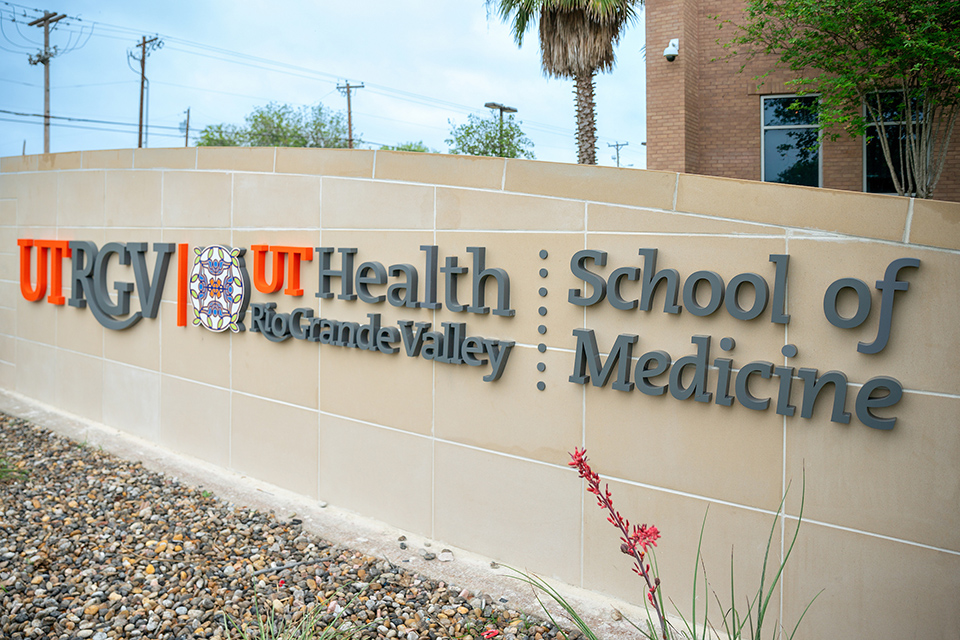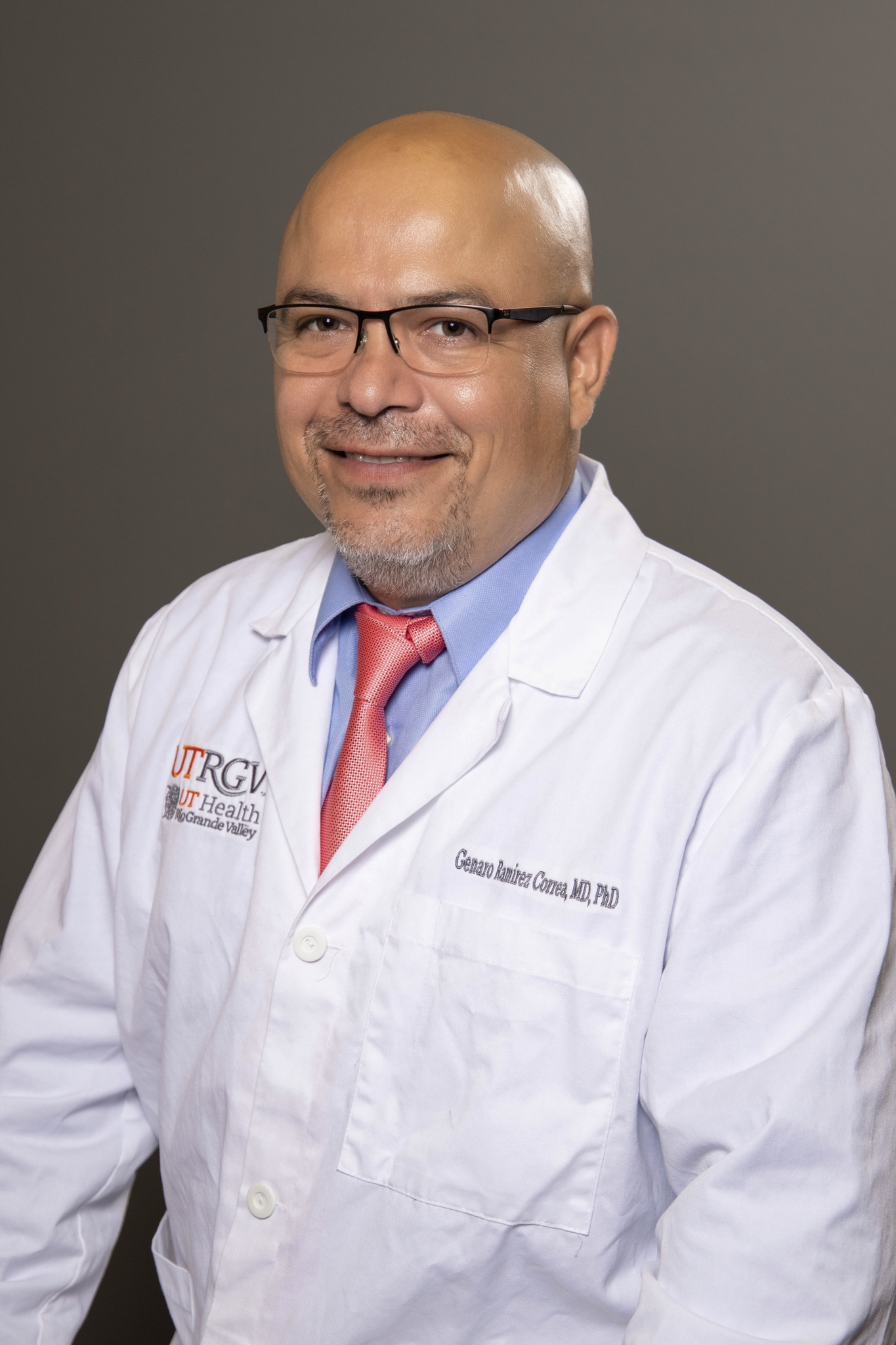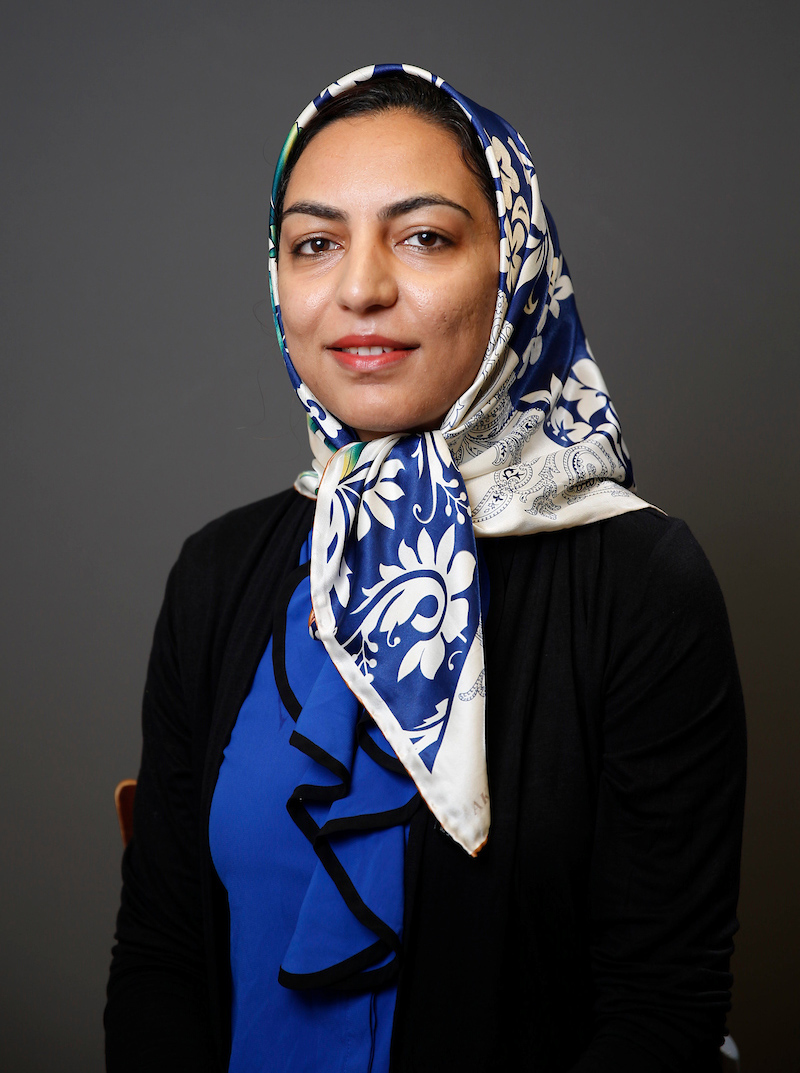
UTRGV School of Medicine Building in Edinburg. (UTRGV Photo by Paul Chouy)
News Release | Research, Health

UTRGV School of Medicine Building in Edinburg. (UTRGV Photo by Paul Chouy)
Wednesday, August 14, 2024
Health, Research
By Karen Villarreal
RIO GRANDE VALLEY, TEXAS – AUG. 14, 2024 – UTRGV researchers are working toward a treatment for cancer that doesn’t compromise the patient’s heart health, a long-lasting side effect of some medications.
Dr. Genaro Ramirez Correa, assistant professor in the UTRGV School of Medicine’s Department of Primary and Community Care (PCC-ISU), Division of Human Genetics, says existing cancer treatments can be a “double-edged sword.”
“Some patients develop issues with their heart after chemotherapy or cancer medication puts them at risk of cardiac failure,” he said.

According to cancer.gov:
Although the Rio Grande Valley’s Health Service Areas of Hidalgo/Starr County Health and Cameron/Brownsville/Willacy County ranked 58 and 54 out of 61 in Texas, respectively, for incidence of cancer among adults, the region faces some of the highest rates of certain cancers in the state and country, like liver and cervical cancers.
To identify why existing cancer treatments compromise the integrity of the heart, Ramirez Correa, brought Dr. Marzieh Ayati to his proteomics lab experiments to contribute her expertise as a computational biologist.
Ayati, assistant professor in the UTRGV Department of Computer Science, develops and uses bioinformatics tools and algorithms to extract meaningful insights from numerical data – such as that generated from Ramirez Correa’s studies.
“This investigation represents a synergistic collaboration bridging experimental and computational biology,” Ayati said. “It offers a unique opportunity to uncover the underlying mechanisms of cardiotoxicity and paves the way for the development of safer and more effective cancer treatments that minimize adverse effects on the heart.”
EXPLORING HEART MUTATIONS
Ramirez Correa began investigating heart proteins in 2006, as a post-doctoral research fellow in the Department of Cardiology at Johns Hopkins University. He and his mentor, Dr. Anne Murphy, saw a similarity between two types of patients who experience heart failure: those with hypertrophic cardiomyopathy, and breast cancer patients treated by a type of medication called Tyrosine kinase inhibitors (TKIs).
Ramirez Correa said hypertrophic cardiomyopathy can cause sudden death from a random arrhythmia in otherwise healthy athletes – likely due to a genetic mutation that alters a protein in the heart and ultimately, negatively impacts the organ’s architecture. Restricted blood flow and an enlarged heart make it harder for the heart to pump blood to the rest of the body.
“I wanted to know why cancer patients were dying of this type of heart failure after using TKIs,” he said.
By taking a systems biology approach, Ramirez Correa and Murphy began to study the hearts of cancer patients who had experienced heart failure to identify any proteins that had been modified by the medication.

CRITICAL PROCESSES UNCOVERED
Ramirez Correa and Murphy found that although TKIs inhibit signals in some critical enzymes to prevent the cell from growing and dividing to treat cancer, targeting these chemical messengers also alters one protein process – tyrosine phosphorylation – a critical regulator for healthy heart function.
“Nobody knows why the signaling of tyrosine is important, but we know it’s lethal if you get rid of that process,” Ramirez Correa said.
His latest research on proteomics – the study of proteins in an organ – which was published in Nature’s communications biology journal, shares that altered tyrosine phosphorylation (pTyr) may play a regulatory role in cardiac hypertrophic models.
With Ayati’s dataset analysis of modified proteins, kinases and associated biological pathways, Ramirez Correa hopes to understand the mechanisms that modulate pTyr.
COLLABORATIVE COMPUTATIONAL BIOLOGY
After Ayati’s statistical analysis, pattern recognition, network analysis and machine learning algorithms identify interesting proteins and kinases from Ramirez Correa’s data, he designs and conducts targeted experiments to validate and further investigate the computational predictions.
“From a systems biology perspective, we're not just looking at individual proteins in isolation, but rather we’re trying to unravel the complex networks and pathways involved in the outcome,” Ayati said. “By integrating proteomics and other data, we can gain a more holistic view of the biological processes at play.”
Ramirez Correa says there are years of work to be done by scientists who study this kind of signaling to help design inhibitors for cancer that don’t put the heart at risk.
“With further studies, we can put in context what pathway could be going wrong for these hearts to get so enlarged,” Ramirez Correa said. “Together, we can eventually build an ‘encyclopedia’ of these modifications.”
ABOUT UTRGV
The University of Texas Rio Grande Valley (UTRGV) was created by the Texas Legislature in 2013 as the first major public university of the 21st century in Texas. This transformative initiative provided the opportunity to expand educational opportunities in the Rio Grande Valley, including a new School of Medicine and a School of Podiatry, and made it possible for residents of the region to benefit from the Permanent University Fund – a public endowment contributing support to the University of Texas System and other institutions.
UTRGV has campuses and off-campus research and teaching sites throughout the Rio Grande Valley including Brownsville (formerly The University of Texas at Brownsville campus), Edinburg (formerly The University of Texas-Pan American campus), Harlingen, Weslaco, McAllen, Port Isabel, Rio Grande City and South Padre Island. UTRGV, a comprehensive academic institution, enrolled its first class in the fall of 2015; the School of Medicine welcomed its first class in the summer of 2016, and the School of Podiatric Medicine in the fall of 2022.